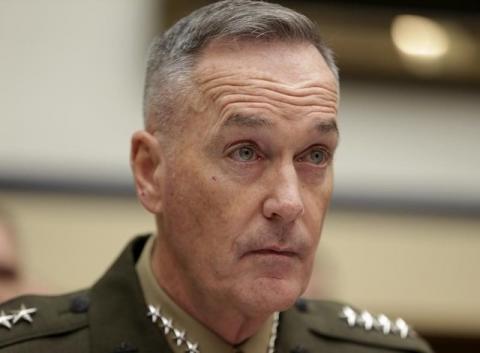Advertisement
U.S. military says decisive action needed against Islamic State in Libya
PARIS (Reuters) - The top U.S. military officer said on Friday urgent and decisive military action was needed to halt the spread of Islamic State in Libya, warning the jihadist group wanted to use the country as a regional base.
Marine General Joseph Dunford, chairman of the Joint Chiefs of Staff, avoided detailing any recommendations he might make in Washington. His goals included better leveraging support in the region from allies, building up local forces capable of defending Libya, and strengthening its neighbors.
"You want to take decisive military action to check ISIL’s expansion and at the same time you want to do it in such a way that's supportive of a long-term political process," Dunford, using an acronym for Islamic State, told a small group of reporters.
Islamic State forces have attacked Libya's oil infrastructure and established a foothold in the city of Sirte, exploiting a prolonged power vacuum in a country where two rival government are battling for supremacy.
The political chaos has also slowed the international community's ability to partner with the loose alliances of armed brigades of rebels who once fought veteran leader Muammar Gaddafi, who was overthrown in 2011.
Western powers hope stability will come via a new unity government announced on Tuesday, though two of its nine members have already rejected it.
"I think it's pretty clear to all of us -- French, U.S. alike -- that whatever we do is going to be in conjunction with the new government," Dunford said after talks with France's military, which is active in parts of Africa battling Islamic extremists.
"My perspective is we need to do more," Dunford said, He would weigh factors including the ability to identify the right forces on the ground to support.
He also suggested that the willingness among Libyans to have foreign military forces "in there, taking the fight to ISIL" would also be important in deliberations about the way forward.
He said he wanted to move soon, but acknowledged that, when it came to Libya, "quickly is weeks not hours", adding that the U.S. military leadership owed President Barack Obama and the U.S. defense secretary ideas about the "way ahead" for dealing with the militant group.
The United States says it killed Islamic State's senior leader in Libya, known as Abu Nabil, in a November air strike by F-15 aircraft.
It believes he was operating in Libya with the support of Islamic State's core leadership in Iraq and Syria, in a likely sign of the country's strategic importance to the group.
"So as I look at Libya, I look at Libya as an ISIL platform from which they can conduct malign activity across Africa," Dunford said.
(Reporting by Phil Stewart; editing by Andrew Roche and John Stonestreet)



















Add new comment